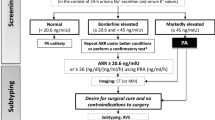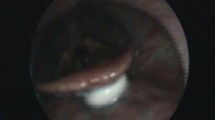Abstract
Pheripheral edema was observed in five female patients after taking proton pump inhibitors omeprazole, lansoprazole, or pantoprazole for 7–15 days for peptic acid diseases in recommended standard doses. Edema disappeared two to three days after stopping therapy but reappeared in all five patients after being reexposed to the drugs. In three of the patients drug kinetic investigations were performed and revealed a slow metabolizer status. During dose-finding studies for intravenous proton pump inhibitors omeprazole and pantoprazole, three of six young female volunteers receiving omeprazole and two young female volunteers receiving pantoprazole developed peripheral edema within 8 hr when high doses of the proton pump inhibitors were applied by continuous infusion together with large volumes of fluid. The edema disappeared within 24 hr after stopping the infusion therapy. Serum hormone concentrations in these patients did not change during therapy, neither did the edema factor C1-esterase inhibitor. As a possible mechanism, a competitive inhibition at the receptor site of female hormones involved in water regulation is suspected.
Similar content being viewed by others
REFERENCES
Bardhan KD, Morris P, Thompson M, Dhande DS, Hinchliffe RFC, et al: Value of omeprazole in the management of erosive oesophagitis refractory to high dose cimetidine. Gut 28:A1375, 1987 (abstract)
Walan A, Bader JP, Meinhard C, Lamers CBHW, Piper DW, Rutgersson K, Eriksson S: Effect of omeprazole and ranitidine on ulcer healing and relapse rates in patients with benign gastric ulcer. N Engl J Med 320:69–75, 1989
Cremer M, Lambert R, Lamers CBHW, Delle-Fave G, Maier C, European Pantoprazole Study Group: A double-blind study of pantoprazole and ranitidine in treatment of acute duodenal ulcer: A multicenter trail. Dig Dis Sci 40(suppl 6):1360–1364, 1995
McFarland RJ, Bateson MC, Green JRB, O'Donoghue DP, Dronfield MW, Keeling PW, et al: Omeprazole provides quicker symptom relief and duodenal ulcer healing than ranitidine. Gastroenterology 98:278–283, 1990
Licht H, Andrieu J, Bognel JC, Bouvry M, Delas N, Denis J, et al: Lansoprazole versus ranitidine in the treatment of duodenal ulcers: Results of a multicentre, controlled, randomized, double-blind study in parallel groups [in French]. Med Chir Dig 19(suppl 4):251–255, 1990
Brunner G, Creutzfeld W, Harke U, Lamberts R: Therapy with omeprazole in patients with peptic ulcerations resistant to extended high-dose ranitidine treatment. Digestion 39:80–90, 1988
Bell NJV, Burget D, Howden CW, Wilinson J, Hunt RH: Appropriate acid suppression for the management of gastroesophageal reflux disease. Digestion 51(suppl 1):59–67, 1992
Chiba N, Rao BV, Rademacher JW, Hunt RH: Meta-analysis of the efficacy of antibiotic therapy in eradicating H. pylori. Am J Gastroenterol 87: 1716–1727, 1992
Nwokolo CU, Smith JT, Gavey C, Sawyer A, Pounder RE: Tolerance during 29 days of conventional dosing with cimetidine, nizatidine, famotidine or ranitidine. Aliment Pharmacol Ther 4(suppl 1):29–45, 1990
Wilder-Smith CH, Halter F, Merki HS: Tolerance and rebound to H2-receptor antagonists: intragastric acidity in patients with duodenal ulcer. Dig Dis Sci 36(suppl 12):1685–1690, 1991
Merki H, Wilder-Smith C: Do continuous infusions of omeprazole retain their effect with prolonged dosing? Gastroenterology 106:60–64, 1994
Brunner G, Chang J: Intravenous therapy with high doses of ranitidine and omeprazole in critically ill patients with bleeding peptic ulcerations of the upper intestinal tract: An open randomized controlled trial. Digestion 45:217–225, 1990
Lind T, Adland E, Eriksson P, et al: Beneficial effects of i.v. omeprazole in patients with peptic ulcer bleeding. Gastroenterology 108:49, 1995
Brunner GHG, Lamberts R, Creutzfeld W: Efficacy and safety of omeprazole in the long-term treatment of peptic ulcer and reflux oesophagitis resistant to ranitidine. Digestion 47:64–68, 1990
Havelund T, Horing H, Boerby S, et al: Omeprazole improves outcome in peptic ulcer bleeding. Gastroenterol 108:51, 1995
Brunner G, Arnold R, Henning U, Fuchs W: An open trial of long-term therapy with lansoprazole in patients with peptic ulceration resistant to extended high-dose ranitidine treatment. Aliment Pharmacol Ther 7(suppl 1):51–55, 1993
Brunner G, Harke U: Long-term therapy with pantoprazole in patients with peptic ulceration resistant to extended high-dose ranitidine treatment. Aliment Pharmacol Ther 8(suppl 1):59–64, 1994
Lamberts R, Creutzfeldt W, Strüber HG, Brunner G, Solcia E: Long-term omeprazole therapy in peptic ulcer disease: gastrin, endocrine cell, growth, and gastritis. Gastroenterology 104:1356–1370, 1993
Brunner G, Meyer H, Athmann C: Omeprazole for peptic ulcer disease in pregnancy. Digestion 59:651–654, 1998
Brunner G, Luna P, Thiesemann C: Drugs for pH control in upper gastrointestinal bleeding. Aliment Pharmacol Ther 9(suppl 1):47–50, 1995
Huber R, Müller W, Banks MC, Rogers SJ, Norwood PC, Doyle E: High-performance liquid chromatographic determination of the H+/K+ ATPase inhibitor (BY 1023/SK & F 96 022) and its sulphone metabolite in serum or plasma by direct injection and fully automated pre-column sample clean-up. J Chromatogr 529:389–401, 1990
Author information
Authors and Affiliations
Rights and permissions
About this article
Cite this article
Brunner, G., Athmann, C. & Boldt, J. Reversible Pheripheral Edema in Female Patients Taking Proton Pump Inhibitors for Peptic Acid Diseases. Dig Dis Sci 46, 993–996 (2001). https://doi.org/10.1023/A:1010745624971
Issue Date:
DOI: https://doi.org/10.1023/A:1010745624971




